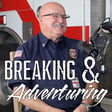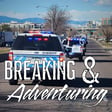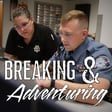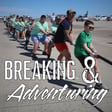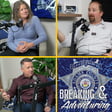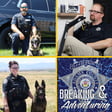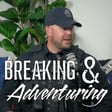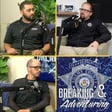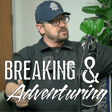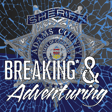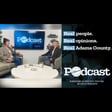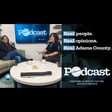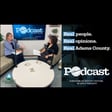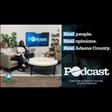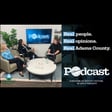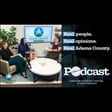Become a Creator today!Start creating today - Share your story with the world!
Start for free
00:00:00
00:00:01

Episode 10 - Adversity and Resilience
Testing to become an Adams County Sheriff’s Office deputy is difficult process, but what if you had to do it twice? A life-altering on-duty car crash forced Sr. Dep. Lisa Pasko to do just that. On today’s episode of Breaking & Adventuring, Deputy Pasko talks about why she chose a career in law enforcement, how she worked her way back onto patrol after that crash left here with critical injuries, and how her journey back to public service has helped other deputies facing adversity.
Do you have questions? We want to answer them. Send us an email to CommunityConnections@adcogov.org.
Recommended
Transcript
Episode Introduction
00:00:23
Speaker
Welcome back to another episode of Breaking and Adventuring, where we invite you into the world of the Adams County Sheriff's Office and beyond. We're going to go into the backgrounds and stories and experiences of the men and women of the Sheriff's Office and the greater law enforcement and public safety
Meet Sergeant Sherman and Deputy Pascoe
00:00:36
Speaker
community. So today, ah we're here with Senior Deputy Lisa Pascoe. I am your host, Sergeant Adam Sherman, and we're just going to talk a little bit about resilience,
00:00:44
Speaker
ah peer support, support, motivation, determination, and ah how that works in this world of law enforcement. You good with that? Sounds good. All right. So first
Lisa's Career Beginnings
00:00:54
Speaker
we'll dive in. ah Lisa, how did you get started in your law enforcement career?
00:00:58
Speaker
I started out as an explorer here at the Adams County Sheriff's Office. So what's that? 17 years old. ah It's for young people, ages 14 up till about 20. mean, you can you age out at 21.
00:01:10
Speaker
Those that are interested in law enforcement, um you know, whether they move on to be law enforcement or not, it's just a good experience to learn about the career. Yeah. And so, so you started that at 17 and where'd take you all over? ah Yeah. So I went to, back then I had to put myself through post Academy. So I went to Red Rocks community college and put myself through post Academy. And then I applied for a job here at the sheriff's office. There you go. So, and for the police academies, they're probably still roughly a semester of college.
00:01:44
Speaker
So yeah the equivalent of, if you go the private route and then ah Lisa kind of alluded to it, previous to 2007, all of our deputies would have to go and get themselves through an academy, they then get hired on later.
00:01:59
Speaker
And now so since 2007 on, we've had our own academy that we host and we um sponsor our own our own recruits and and new hires. So, it's awesome. So, from that time, from 17 till now, what are some like ah cool things you've done or assignments you've had?
Roles and Challenges in Law Enforcement
00:02:18
Speaker
Well, I started out in the jail. I worked about a year and a half in the jail, and then I applied to come out to patrol. So I worked the patrol division. um um patrol, I did a short stint as a school resource officer.
00:02:31
Speaker
i was a field training officer, um and then I got in a bad car crash, and ended up Getting, a I call it demoted, to a record tech position.
00:02:45
Speaker
um So I worked records ah as a record tech in the jail. um Then I came back got certified when I was done healing and went back to the jail for a few months, came back to patrol, and I got on the peer support team when it started out.
00:03:04
Speaker
And then um now I'm currently the training coordinator and admin deputy control division. Awesome. So thinking all way back to the 17 year old you and then the 21 year old you.
00:03:18
Speaker
So when you first got started coming out of the Academy, was it what you were expecting or, you know, how was, how was the career or how did it first hit you when you're on your own? Yeah, I think having done the Explorer program, it um laid the pathway as far as law enforcement is concerned. It gives you that view of law enforcement. So pretty much everything that I expected it to be.
00:03:41
Speaker
Awesome. So you're prepared, ready to rock. So that's, and that's, that's good. I mean, it it gives, uh, you know, a kid's a sense of what a career might be. Plus some, uh, control training, uh, along with our deputies and our staff. And I know you guys as advisors now do an amazing job with that program too, to keep it ah alive and thriving.
00:04:01
Speaker
So what was, as you got ah going through the jail, down to patrol, um you know, any, any fun or crazy calls or experiences that come to mind when you kind of look back over those years?
A Frightening Pursuit
00:04:14
Speaker
Yeah, I mean, there's a ton of them, but one of the most scary call that I went on is me and another deputy ended up finding a stolen car. It was occupied, and he starts giving pursuit to the vehicle in a trailer park, and bad guy is backing out of the trailer park at a high rate of speed.
00:04:38
Speaker
All right. All the way out. All right. He backs into a gas station, almost hits some gas pumps. So that deputy followed him into the gas station. I stayed out on the street.
00:04:50
Speaker
And he comes out onto the road and hits some ah mulch and loses control a car, hits a telephone pole, and that thing snapped, shot up in the air. And then all I see is the wires coming down yeah on my car.
00:05:04
Speaker
And I'm pretty sure I had an open mic saying some choice words yeah on the radio because it was very scary. And then the... the with the lines hitting the car, you could just feel the electricity go through the car. That was scary.
00:05:17
Speaker
Yeah. No. Yeah. it's and And it even happened almost like in slow-mo. Oh, yeah. the The wires just going up and then coming down onto the car. Yeah. I had a similar one where...
00:05:28
Speaker
ah I mean, you'll, you'll know in some of our listeners, but ah coming out of one of our apartment complexes, there's ah a road that's split with a canal. So I knew this guy only had one way to go. So I'm chasing him and I see him start to veer.
00:05:41
Speaker
And then same thing hits a fire hydrant fire hydrant, which those things are cast iron and heavy goes flying about 10 feet in the air And then behind the fire hydrant was a telephone pole. So there's water shooting out. He goes, car goes up the pole and then comes down, pole comes down wires. And I was just like frozen, like, ah, but yeah, total slow motion where I'm like, no.
00:06:03
Speaker
So yeah, nightmare. Um, So you mentioned, ah your, your accident.
The 2009 Accident and Recovery Journey
00:06:11
Speaker
So I know, and and currently you're huge into, you know, peer support, mentorship, support and others giving back training.
00:06:18
Speaker
Um, how much does, did your accident kind of play into that mindset now of making sure others are supported and prepared around you? Um, so when I was in my accident, it was December of 2009. Mm-hmm.
00:06:34
Speaker
And I was in critical condition in the hospital for almost a month. um Broken femur, broken tib, fib, three ribs, bit through my face.
00:06:45
Speaker
um Just that ah traumatic injury. And then when I was ready to come back light duty, and just... I didn't know what was wrong with me.
00:06:58
Speaker
And so I reached out to a deputy who was senior to me and that I trusted and And at that time, our EAP was Nicolette Inflator. And so she's like, maybe you should call. And that was one of the hardest phone calls I made for myself, just to call and be like, something's wrong with me. Yeah. for what So I was struggling with anxiety coming back.
00:07:22
Speaker
And then like just the stress of the injury and not being able to come back full duty. um So I just went through a lot of psychological problems.
00:07:35
Speaker
um issues and ultimately i was diagnosed with ptsd um from having gone through that yeah and and and that was on-duty accident so you know you're worried about being able to even am I able to perform this job, this job that love, that I've trained for?
00:07:54
Speaker
So I can't imagine just the the stress and the and the concern that you're putting on yourself along with all the physical healing and and stuff that you're doing. So that's long Yeah, I remember remember um the night of the accident. I don't remember a whole lot of it, but I do remember being in the hospital and them talking about I could potentially lose my leg. So yeah.
00:08:14
Speaker
Um, and with all that, I, I had to learn how to walk again. um literally couldn't make my muscles work in my leg because they were just close. Yeah.
00:08:24
Speaker
So it was, it was a lot to go through. So as you're, you know, you're in the hospital, like what was your mindset then? Was it just the concern about day to day or were you looking long-term even as you're just, you know, dealing with that? How was it?
00:08:39
Speaker
Um, kind of day to day. Um, like I said, I had to learn how to walk all over again. um I had to, i had to stay in the hospital to go through, um, occupational therapy because I, how am I going to take care of myself at home by myself? Yeah.
00:08:57
Speaker
So they, they were great. They taught you, you know, how to use a walker, how to, um, we get around the house, how to go through your kitchen, getting in out of the bathroom, stuff like that. So just, it makes you definitely, um, not want to take little things, normal things for granted when you, when you are afraid to lose that.
00:09:18
Speaker
Yeah, absolutely. Well, and what was that road to recovery? Like, like just what's some of the timeline? Um, like i said, I was, uh, I was in ICU initially for three or four days and then in the hospital. I had some complications with my first surgery.
00:09:37
Speaker
So I had to wait, I think like 13 days before I get done my second surgery on my lower leg. And then with the rehab, like said, I was in the hospital almost a month. um And at that time, you know, people would come visit me all the time. And that then when I got out of the hospital, being at home, that was that was really difficult because I couldn't drive.
00:09:58
Speaker
was my right leg that was busted up. I can't drive myself. I'd have to find rides to go to, like, physical therapy. And then started going to the therapist for my... head yeah uh you know i'd have to find rides um luckily my brother was unemployed at the time so he was my uber there you go and uh so that and then being home people kind of dropped off people wouldn't check in they didn't call they didn't come over um so that's i think when a lot of the psychological stuff started happening for me um just feeling really lonely and isolated yeah so
00:10:36
Speaker
Yeah. And independent. I mean, this is a job where you're so independent um and to become dependent on everybody. It was really hard. Yeah. You know, being dependent, but also coming out of environment where, you know, we work in shifts where, know, we're in groups together, we're supporting each other and then now be isolated alone. That must have you just.
00:10:57
Speaker
total um, just a nightmare at at times just to have to deal with. So, well, and then coming out of that, what did that look like when you started healing and starting to figure out your pathway back?
Return to Duty and Continued Challenges
00:11:10
Speaker
Um, so i came back, i was on light duty for quite a while. Um, One of the positive things of that, um I had the opportunity to, at that time we had ah the internet sex crimes against children unit. Okay.
00:11:24
Speaker
And I got to work with that detective and do the online, like to catch a predator, right? Yeah. So that was really interesting. I learned a lot and I had a good time doing that. But then when that kind of disbanded, I still wasn't able to recover.
00:11:39
Speaker
I ended up having more complications. I've had to have several surgeries. um actually it's been about a year i had my last surgery which the eighth surgery ah year ago wow um so it just that was that played on me too it's like i'd start getting better something went wrong and i have to have another surgery so then that starts process all over right um so finally they're just they had extended my trd as long as they could so um, they had to move me into a record tech position and, and it was a movement. Like I was no longer a deputy.
00:12:13
Speaker
I got a record tech salary and did that job. So, um, but that I gained so much respect for the record techs. They do so much work and they don't get paid a lot of money. So I have a lot of respect for the civilian staff at the Yeah. No, you're, I mean, we have an army of people behind this, you know who you see in and the uniform and the badge is a whole army behind us that do the supportive work that yeah we couldn't do our job without theirs. Definitely. Absolutely. So that's, that's amazing. Well, I mean, it's an interesting way to go about it, but it's you know good that you had that perspective. And I know you bring that, you know, when you do sit down with people for either a mentorship or just, you know some, some help or guidance or peer support along the way. And so having that,
00:12:57
Speaker
That wider vision is a huge, huge plus. So coming out of that, so you, ah you know, cause I heard the mythical stories of the, of the great Lisa Pasco and stuff when I was a young deputy coming up.
00:13:11
Speaker
And so knowing how hard you were fighting to get back, what was it like when you finally actually were able to test for deputy and get it and make it back and be able to be where you, where you should have been? and Um, I actually ended up testing, I think a couple times.
00:13:25
Speaker
Um, the, the first time i tested, um, I got through the process, but then went obviously for the psych and I ended up not passing the psych and that was pretty devastating, but clearly I wasn't ready to come back.
00:13:39
Speaker
Yeah. Um, so I had to get extended. So I had to wait, um, another, i don't remember how long retest and I had to retest again. um and then And then with that time, there was a thing, the workman's comp doctor, when they signed me off, it was just a mess with, they actually put an 80 pound weight restriction on me. And so when they went in, they were going to fail me.
00:14:02
Speaker
oh But I went to the workman's comp doctor got clarified. He's like, no, you don't have a weight restriction. So I was able to get that smooth the way, like, yeah. Yeah. um So it was ah it was very um it was a good day to get sworn back in.
00:14:18
Speaker
um Got sworn in by Sheriff Dar. And one of the things he said to me was, as um she's got more tenacity and perseverance than anyone I've ever seen.
00:14:29
Speaker
So just that fight of just trying, trying, trying to come back and just not giving up. Yeah. And I think that's a huge message behind this is you know, you had so many obstacles and roadblocks and things, areas or any, any moment where you could have just said, forgive it, given up, taken, you know, whether it's through a medical retirement or just walking away and trying to figure out something else. And you didn't, you kept, you kept fighting and you, you know, had, I know you had the the support of some your old, old shift mates and stuff around you as well. And looking forward to you.
00:15:01
Speaker
So when you finally um got back into service, what year was that?
Mentoring and Career Reflections
00:15:04
Speaker
I ah believe I got sworn back in 2015. And then, and then because of the PTSD, they wanted me to go back to the jail and just kind of get reacclimated.
00:15:14
Speaker
So I only worked a few months in the jail. Everybody was like, yeah, you're, you could teach us how to do this job. And then it was fun going back to patrol. Cause one of my FTOs was like, I, I was actually his FTO, yeah you know, back in the day. So, um, they were all really great and supportive and yeah you can teach us a thing or two.
00:15:34
Speaker
Absolutely. So a six year journey finally culminates. then I know,
00:15:40
Speaker
I think I was on swings and you were coming in training, coming in on grades, but yeah, I finally met you and I can't remember who the f the FTO was at the time. They're like, hold on, let's let tea Lisa take this. And I'm just like, whatever. I'm like, she could evaluate all of us, please. um But yeah, I know you breezed through that pretty quickly and we're just up and running. So that's awesome. I mean, I i love hearing that um not only from the perseverance standpoint, but just, you know, that, that,
00:16:06
Speaker
the mental gymnastics you did and overcame, um, and then to still come back and be an impactful, empathetic deputy out on the street, not only to your shift mates, but to those that you're responding to. um you know, I saw it firsthand. I know everybody loves you. So it's, it's, it's great, uh, being able to have that story that people can reference whenever they're having a tough time.
00:16:27
Speaker
Well, enough for the sad stuff. Yeah. Um, you know, any along, I guess along those ways though, did you have any like certain benchmarks or anything that were like, you're almost using as motivation at certain points through your journey back?
00:16:41
Speaker
Um, not really. just wanted to come back. Gotcha. You know? Yeah. Yeah. the The big goal. Yeah. That was what I wanted to do since I was a kid. So yeah, it's like just wanted to get back. There you go.
00:16:56
Speaker
Well, I, uh,
00:17:01
Speaker
What's a fun fact that maybe somebody wouldn't guess about you? Any special hobbies or talents or um things you like to do? i I like photography.
00:17:15
Speaker
i actually, ah my last surgery, I taught myself how to crochet. So i yeah I learned on the woobles. And so I am a wooble crocheter now. There you go. So you make your own like little hats and dish rags and stuff. yeah Good for you.
00:17:30
Speaker
That's awesome. There you go. We got a crochet in the mix too. um when people are out, if they, if they've just meeting you and and somebody finds out that you're, you're a deputy, what's like the question you get asked the most?
00:17:44
Speaker
Oh, what's the scariest thing yeah you've done usually? or you know, that's usually the question. Yeah. Or don't arrest me or he did it. or Yeah. Oh, it wasn't me.
00:17:57
Speaker
Yeah. Or do you know so-and-so? They're cop in Missouri. Right. Yeah. No.
00:18:04
Speaker
um what tv shows do you like that or or have you seen they're actually like all right that's actually legit ish about what it looks like in law enforcement um i like southland okay that's a pretty good one um the wire was a pretty good show kind of tells the cop side the drug dealer side yeah all the all the people's sides of the story that one's a pretty good show and like Bosch.
00:18:28
Speaker
ah Okay. Pretty decent flick too. Nice. All right. I mean, they're all kind of a little far fetched. Yeah. They, they have to have the little bit of exaggeration, certain areas. um you know, I've heard Brooklyn nine, nine true detective was reno nine one one now that's really classic. Yeah.
00:18:42
Speaker
Yeah. And that's yeah. People doing the falling down and chases or just your car rolling away as you're trying to walk up to another car or something. Yeah. So Reno nine, one's pretty accurate. i would agree with that. ah Um,
00:18:55
Speaker
So if if if you know or you know you're around somebody who might be interested in getting a career in law enforcement, like what's something you would encourage them to
Advice for Aspiring Officers
00:19:02
Speaker
to do? What kind of message would you have for them to maybe... Well, if they're younger, like I said, the Explorer program awesome because before you invest all that time and potentially money into something that you're like, I, this really isn't for me.
00:19:16
Speaker
It's a great opportunity to learn about the career. Um, but you know, obviously if they're too old to go through the program, just going on ride alongs, um, know, if they can have the opportunity to go sit in detectives or go sit with somebody and ride alongs, I think that would be the,
00:19:33
Speaker
the way to at least get a little taste of the career. Yeah. And, you know, just, especially with the Explorer program, you having these 17 to 20 year old kids, I mean, worst case scenario, even if they don't go into law enforcement, they're going to come out of that program with great critical thinking skills, you know, some crisis management, being able to think on their feet, um, you know, team building and being able to see work towards those greater goals. So, I mean, that program alone, um, even if somebody is not looking for a career is, is hugely beneficial.
00:20:03
Speaker
ah One of the, one of the explorers when he first got on, he's like, I just want to learn to be a good person, like better person. So yeah, even if they're not, you know, interested in the career, does. It just teaches you life skills. so Yeah. And you know, for anybody that's interested or has a 14 to 21 year old in their household, feel free to look at our public website and we we have a whole tab for our Explorer posting, learn all about it and apply for that program.
00:20:27
Speaker
Um, well, you know, as we, I know, you hinted at, you know, possibly rounding out your career and looking for something, you know, change, closing this chapter and looking for something else.
Gratitude and Support
00:20:38
Speaker
Um, you know, are there anybody, any any particular people that stand out as just like, man, I don't know if I would have been able to get through that or take that extra step without their support?
00:20:49
Speaker
Um, well, when I came back, um, for my second round of phase training on patrol, um, I had Steve Hershey as my FTO and he's just, he was a, ah a good cop.
00:21:02
Speaker
He can dig stuff up and a great teacher. So, um, I was actually a little nervous to have him, but I was actually like glad I had him. Cause I'm like, if I can learn something from somebody, it'd be Steve Hershey.
00:21:13
Speaker
Um, so Hershey's top notch. Nice. Yeah. And then, you know, having, uh, And being welcomed back in, I'm sure, you know, everybody was just, it was almost like cheers, right? we You showed back up to briefing. Everybody's like, well, Lisa.
00:21:28
Speaker
Yeah. It's good to get back with like Davis and Schulze and mild, mild, uh, partners. Were you able to go back to your same shift six years later? Yeah. Obviously, some things have changed. Trimble and Hessler got on the shift, but you know great dudes. and um yeah That's cool. It was pretty good. Yeah, because I know some people, you know maybe they go on leave for a month for medical, and then they're like, bad they Yeah, everyone's gone. Yeah, everybody's gone, or they they have to be go go to a different shift something. That's actually pretty cool to tie that back into some of your old year old shift mates, too. Yeah, and old old Cliff, Cliff Brooks. yeah I loved Cliff. He was...
00:22:01
Speaker
He was always welcoming. So yeah, that's great. Welcome back. And well, again, you know, I just, I love hearing your story and obviously not for the gory details, but just the kind of Phoenix rising from the ashes aspect of it. Cause you know, anybody, whether it's mental health stuff, physical stuff, you know, stress stuff, family stuff, you know,
00:22:22
Speaker
if if you can make through make it back through what you did have a tremendous career and, you know, inspiring others, i mean, anybody could can get through what they're, you know, but you bring up a great point is also taking that step and asking for help, seeking out a little bit of help if you don't have the resources yourself. It's a hard thing to do. And, um you know, I experienced pretty much every range of emotions there is to experience, ah to include being suicidal.
00:22:49
Speaker
So, I've been down that road and if I can help somebody else, that's my ultimate goal. Awesome.
Conclusion and Engagement
00:22:55
Speaker
No, and I love it. Well, thanks for coming on, Lisa. I appreciate it. And you know, for those of you might not know, this is our second go around. So we had a little technical difficulty on round one, but the round two, um you know, you knocked it out of the park again and you know we love, love seeing your face around and we're going to miss you when, when eventually you do hang them up, but hopefully it's not too soon. and All right. I know the days are flying by, but um Well, that's another episode of Breaking and Adventuring. So I want to just thank you again.
00:23:22
Speaker
And if anybody has any questions, topic ideas, um you know ah one further information on anything, feel free to reach out to us at our email address, communityconnections at adcogov.org.
00:23:33
Speaker
And feel free to follow us on any of our social media platforms. Until next time, see ya.

